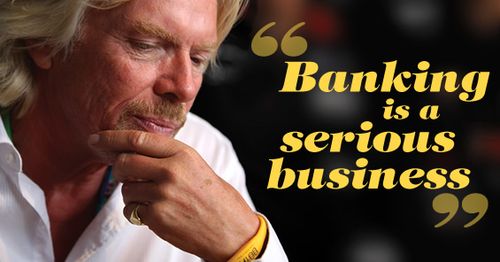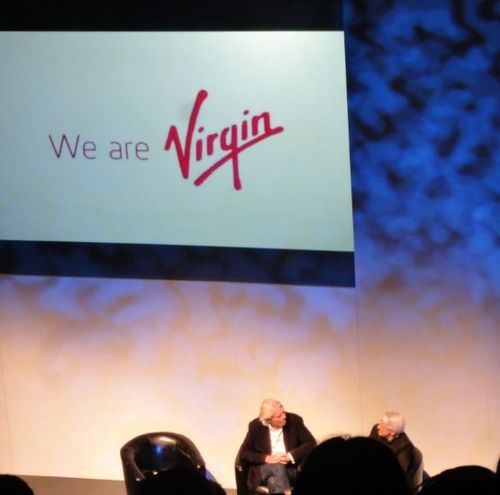
I've been having a bit of a Richard Branson overload this week.
Everywhere I go and look, he's there.
He's on TV, in the papers, in my specialist magazines and even at the tradeshows I go to.
What's going on?
He's got trains, planes, intergalactic flights and more.
And yes, he's got a bank.
Virgin Money recently launched its first major ad campaign since the takeover of Northern Rock.
Here's the ad:
"40 years of better ... now in a bank" and a promise: "our quest to make banking better starts here."
All sounds well and good.
Follow this up with interview after relentless interview about how he's going to make Britain's, and then the world's banks better, and you get a warm feeling about the Virgin objective to shake up financial services.

I say the world's banking, because Branson made it quite clear at an interview with Business 2012 on Sunday that Virgin Money is not just for the UK. Having said that, on previous form, I actually suspect he means Virgin Money will also be in Australia and America. That's the world for you.
Meantime, how is Virgin going to knock our socks off in banking?
That was a question put to the bearded wonder in the latest Chartered Insurance Institute magazine. Here’s his answer:
Jayne-Anne Gadhia, chief executive officer at Virgin Money and her team will use the trusted Virgin brand to create a different kind of bank that makes everyone better off. This means good deals for customers (93% of our customers are satisfied or delighted), a sensible and fair return for shareholders, a great place for staff to work and win-win relationships with partners.
I believe this philosophy is right for the times, and right for the consumer, and it has helped us build a business which we are confident can continue to bring a real and attractive alternative to the financial services sector. Virgin Money will deliver a straightforward, personal and compelling proposition and experience for UK customers. We will incorporate our insurance offering through all available channels in 2012 including branch, phone and online. The 75-branch network will undoubtedly grow and I expect customer numbers to grow significantly during the next five years.
The thing is that Virgin has not changed anything in financial services in the past, and I don’t think it will in the future.
Like Virgin Mobile, Virgin Money is going to be just another provider.
The Virgin Mobile, Virgin Media and Virgin Trains, often representing some of the worst services in Britain, Virgin Money will be a great brand and that's about it.
How can I say such a thing
Because Virgin began life as a consumer champion but, over time, has become just another business with a cool brand.
The interest of the business are, as Branson says above, in the interests of the shareholders and partners.
The customer just tags along and is roped into the idea that the brand is in their interest when it clearly is not.
For example, what has Virgin Money done as its first act to improve banking in Britain?
Hiked up interest rates for existing credit card holders by 50 percent, whilst keeping an attractive rate for new customers.
That's classic banking practice - sting the existing customer who can't be bothered moving whilst catching new customers through rate churn.
Virgin Money is just another bank and, as Mathew Vincent says in today's Financial Times:
Is this inconsistent with Virgin Money’s status as a chirpy upstart high-street bank? No, it’s what banks do. It’s just that it jars a little with Sir Richard Branson’s new advertising slogan: “40 years of better, now in a bank” ... but often it’s not the answer you get but the way it’s delivered. Tell someone their “better” bank is charging them more, but do it in a 1970s public school mockney accent, with a beard, and you can get away with anything.
1995
Virgin Direct opens for Business (Now Virgin Money)
2007
Virgin Money is named Britain’s fastest growing private company in the Sunday Times Profit Track 100.
2010
Virgin Money becomes a bank.
2011
Virgin Money acquires Northern Rock.
Postscript:
Listening to Branson at Business 2012, there's an interesting dialogue about why he dislikes banks, or rather Coutts Bank.

Coutts is the Queen's bank, and only serves the very rich. It was Branson's bank when he launched Virgin Airlines in 1984.
Here's the story of what happened recorded last night:
Richard Branson on why he dislikes banks
Or a more comprehensive version from Richard Branson: The Inside Story by Mick Brown (1988):
When Richard Branson returned from New York somewhat hungover and in a state of weary exhilaration, there was a visitor waiting at his London home to see him.
Chris Rashbrook, the manager of Virgin's account at Coutts Bank, had hoped to avoid this meeting, but over the previous week circumstances had made an unpleasant and embarrassing task unavoidable.
For some time, Coutts had been considering an application from Virgin to increase their overdraft facility above the previously agreed limit of £4 million.
The previous week, Virgin had requested immediate permission to go over the facility by some £200,000, to meet short-term outgoings for the airline (to pay, in fact, for the engine which had expired on the air-operator's test flight).
The application had been subject to long and disapproving scrutiny at Coutts.
The bank had made no secret of their dismay over Virgin's venture into airlines.
For a company with Virgin's limited borrowing power the venture seemed foolhardy, not to say suicidal --- notwithstanding Branson's protestations about 'protecting the downside.' But that was not all. In the last year Virgin had invested some £4 million in their first major film project, Electric Dreams; more money was now being poured into yet another, a new version of George Orwell's book Nineteen Eighty-four. When would it end?
Rashbrook broke the news as delicately as he could. He had come, he said, to give Branson a message. Coutts had considered Virgin's request to exceed their overdraft by £200,000 over the next seven days. And had decided to refuse it.
If Virgin exceeded their overdraft by so much as £25, the cheque would, alas, be returned marked 'refer to drawer.' In a word, bounced.
'This is an absolute farce,' Branson said.
Coutts had been informed that a cheque for $6 million was expected at any moment from MGM films in America --- payment for the distribution rights of Electric Dreams. The company had made a proper request to extend its facility.
'You're telling me that it's official Coutts policy to bounce a cheque on one of the ten biggest private companies in Britain?'
Rashbrook nodded silently.
Branson felt indignant.
Virgin had shown a profit of more than £11 million in the last year. At an absolute minimum, the worth of the company must be £100 million (in fact, within the next two years it would be worth £250 million). And yet Coutts were threatening to bounce cheques of £25!
In fact, Branson should have known it was coming.
Virgin and Coutts had long been growing apart. From the earliest days of Student magazine, Coutts had indulged the idiosyncrasies of Branson's banking practices with bemused aplomb. They had raised only the most discreet eyebrow at the bedraggled urchins who queued to deposit the takings from the magazine and mail-order; at the implausible schemes for manor-house recording studios and sundry businesses of a bizzareness beyond the bank's mannered comprehension.
The Bransons, after all, had banked with Coutts for generations. Richard was one of 'us' -- after a fashion. But, in recent years, the relationship had outgrown even that important bond. Virgin were now a commercial concern, trading with a flair, and a lack of convention, that tested Coutts's nerve and understanding. Such assets as Virgin had were almost meaningless: not the bricks and mortar so reassuring on the balance sheet, but the more nebulous assets of music and publishing copyrights --- tangible enough, perhaps, to people who understood the music business, and knew that at any given moment Virgin could raise millions if they so chose; less comprehensible to a bank where customers were still greeted by frock-coated doormen. [ ... ]
The prospect of changing banks had been discussed before.
But changing banks, as Branson was prone to saying, 'is a bit like changing your parents for a new set. When you've been with the same bank since you were thirteen, you somehow feel they will grow up with you.' This was patently no longer the case.
Branson brought the conversation with Rashbrook to a perfunctory close. 'I'm sorry,' he said, 'but you are not welcome in my house. I'd rather you left.'
Chris M Skinner
Chris Skinner is best known as an independent commentator on the financial markets through his blog, TheFinanser.com, as author of the bestselling book Digital Bank, and Chair of the European networking forum the Financial Services Club. He has been voted one of the most influential people in banking by The Financial Brand (as well as one of the best blogs), a FinTech Titan (Next Bank), one of the Fintech Leaders you need to follow (City AM, Deluxe and Jax Finance), as well as one of the Top 40 most influential people in financial technology by the Wall Street Journal's Financial News. To learn more click here...




















